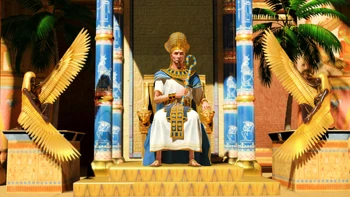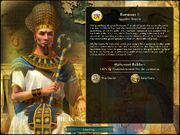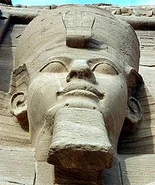Ramesses II (c. 1303 BC – July or August 1213 BC) was the third Egyptian pharaoh of the Nineteenth Dynasty, reigning from 1279 BC to 1213 BC. He leads the Egyptians in Civilization V.
In-Game[]

Ramesses II in game
Ramesses II speaks Classical Arabic ("fus-ha") with a distinctive Egyptian accent. (Fusha was most likely chosen over Ancient Egyptian because no pronunciation guides were ever recorded for that language, and because Coptic, the descendant of Ancient Egyptian, is spoken by only a few people.) On his diplomacy screen, he is sitting on a throne in his open-air palace.
Unique Ability: Monument Builders
Voice Actor: George Saad
AI Traits[]
| Trait | Amount |
|---|---|
| Competitiveness | 4 (6-2) |
| Wonder Competitiveness | 9 (10-7) |
| City-State Influence Competitiveness | 5 (7-3) |
| Boldness | 5 (7-3) |
| Diplobalance | 5 (7-3) |
| Hate Warmongers | 6 (8-4) |
| Willingness to Denounce | 4 (6-2) |
| Willingness to Declare Friendship | 6 (8-4) |
| Loyalty | 4 (6-2) |
| Neediness | 5 (7-3) |
| Forgiveness | 3 (5-1) |
| Chattiness | 4 (6-2) |
| Meanness | 6 (8-4) |
| Offensive Unit Production | 4 (6-2) |
| Defensive Unit Production | 6 (8-4) |
| Defensive Building Production | 6 (8-4) |
| Military Training Buildings Production | 3 (5-1) |
| Recon Unit Production | 5 (7-3) |
| Ranged Unit Production | 6 (8-4) |
| Mobile Unit Production | 6 (8-4) |
| Naval Unit Production | 5 (7-3) |
| Naval Recon Unit Production | 3 (5-1) |
| Air Unit Production | 4 (6-2) |
| Naval Growth | 5 (7-3) |
| Naval Tile Improvements | 5 (7-3) |
| Water Connections | 5 (7-3) |
| Expansion | 5 (7-3) |
| Growth | 6 (8-4) |
| Tile Improvements | 7 (9-5) |
| Infrastructure (Roads) | 5 (7-3) |
| Production Emphasis | 7 (9-5) |
| Gold Emphasis | 6 (8-4) |
| Science Emphasis | 5 (7-3) |
| Culture Emphasis | 7 (9-5) |
| Happiness Emphasis | 6 (8-4) |
| Great People Emphasis | 6 (8-4) |
| Wonder Emphasis | 10 (10-8) |
| Religion Emphasis | 7 (9-5) |
| Diplomacy Victory | 5 (7-3) |
| Spaceship Victory | 8 (10-6) |
| Nuke Production | 8 (10-6) |
| Use of Nukes | 5 (7-3) |
| Use of Espionage | 5 (7-3) |
| Anti-Air Production | 5 (7-3) |
| Air Carrier Production | 5 (7-3) |
| Land Trade Route Emphasis | 5 (7-3) |
| Sea Trade Route Emphasis | 5 (7-3) |
| Archaeology Emphasis | 5 (7-3) |
| Trade Origin Emphasis | 5 (7-3) |
| Trade Destination Emphasis | 5 (7-3) |
| Airlift Emphasis | 5 (7-3) |
| Likeliness to Declare War | 3 (5-1) |
| Likeliness to be Hostile | 7 (9-5) |
| Likeliness to be Deceptive | 6 (8-4) |
| Likeliness to be Guarded | 7 (9-5) |
| Likeliness to be Afraid | 6 (8-4) |
| Likeliness to be Friendly | 5 (7-3) |
| Likeliness to be Neutral | 5 (7-3) |
| Ignore City-States | 5 (7-3) |
| Friendliness to City-States | 5 (7-3) |
| Protection of City-States | 7 (9-5) |
| Conquest of City-States | 5 (7-3) |
| Bullying of City-States | 4 (6-2) |
Personality and Behavior[]
Ramesses will normally try to win a scientific or cultural victory.
Ramesses focuses his attention on building as many wonders as possible. He will become jealous if the player completes wonders he wanted to build.
To complement his exceptional emphasis on wonders, Ramesses puts a priority on increasing the overall ![]() Production of his cities. He will also try to found a religion early on, and will usually pick the Monument to the Gods pantheon belief if it is available.
Production of his cities. He will also try to found a religion early on, and will usually pick the Monument to the Gods pantheon belief if it is available.
Ramesses tends to be protective of city-states.
Ramesses will not raise a large army, but he is very likely to try to get nukes.
Although he often tries not to get involved in a war, Ramesses is rather difficult to befriend, and he tends to backstab his allies.
Civilopedia entry[]
History[]
Ramesses II is considered to be Egypt's greatest and most powerful pharaoh. Taking the throne in his twenties, Ramesses ruled Egypt for more than 60 years. Ramesses is remembered as a great military leader as well as for the extensive construction programs he instituted. He is also remembered for building a new capital city, Pi-Ramesses. Some historians believe that Ramesses is the pharaoh in the biblical story of Moses. He died of old age.
Early History[]
Egypt having recently emerged from a period of declining power and prestige, Ramesses' father, Seti I, spent a good deal of time subduing rebellious provinces in Asia. The Hittites, based in Asia Minor, were extending their power southward, and the two great civilizations were engaged in a protracted struggle for control of Syria and Palestine. The young Ramesses accompanied his father on some of these campaigns; by the age of 10 he was given the rank of captain – though this was almost certainly ceremonial, it does suggest that his military training began at an extremely young age. Ramesses assumed the throne in his early twenties, following his father's death.
Military Campaigns[]
Four years after becoming pharaoh, Ramesses led an army north to retake the rebellious provinces that his father had been unable to conquer. The campaign was apparently successful, and the army advanced as far as Beirut.
In the following year Ramesses attacked the Hittite stronghold at Kadesh. The Battle of Kadesh is one of the few battles from that period of which we have records. Believing the citadel to be abandoned, Ramesses approached incautiously and was ambushed by a large Hittite chariot force hiding beyond the fort. Although Ramesses achieved a marginal victory in that battle, his army was so weakened that he had to retreat to Egypt, leaving the fort in Hittite hands. Ramesses continued to battle the Hittites for some twelve more years, attaining tactical victories, but unable to hold the contested land for any time.
In addition to his wars with the Hittites, Ramesses campaigned in Nubia and Libya, extending his rule to the west and south. However these were of much less importance as these enemies posed little threat to the survival of Egypt.
Peace with the Hittites[]
Eventually realizing that further combat was pointless, in the twenty-first year of his reign, Ramesses agreed to a peace treaty with the Hittites. This is the earliest known peace treaty in recorded history. Interestingly, the treaty was written in two versions: the Egyptian version states that the Hittites sued for peace while the Hittite version states that it was the Egyptians who requested an end to hostilities.
This treaty appears to have stabilized the borders between the two great powers, and no further combat between Egypt and the Hittites occurred during Ramesses' reign.
Pi-Ramesses[]
Early in his reign Ramesses moved his capital from Thebes north to a city in the Nile Delta, which he renamed "Pi-Ramesses." The new location was near to his ancestral home, but more importantly it was far closer to the troublesome Northern provinces and the dangerous Hittite border. In a few short years the once-sleepy village was transformed into a major governmental center as well as an arms manufactory. The city was graced with a beautiful palace and many temples, as well as numerous statues and other ornaments.
Pi-Ramesses was abandoned long after Ramesses' reign. For many centuries the site was lost, but archaeologists have recently discovered ruins that they believe belong to the ancient city.
Public Works[]
During his reign Ramesses constructed many public works across Egypt. Many of these were temples and monuments, but he also constructed storehouses, government buildings, water works, and so forth. Evidently a tireless self-promoter, Ramesses covered Egypt with statues and carvings of himself, often recarving those of previous pharaohs with his name and image. (Ramesses ordered his masons to deeply engrave his image in the stone so that future pharaohs would have trouble doing the same to him.)
Biblical Connection[]
Many historians believe that Pi-Ramesses is the city "Raamses" mentioned in the Old Testament of the Bible, one of the "Treasure Cities" constructed by the Israelites during their Egyptian Captivity. Some believe that Ramesses is in fact the pharaoh of the Biblical story of the Exodus, the ruler who Moses forced to free his people. However, this is open to debate (particularly since Ramesses II lived a very long life).
Death and Burial[]
Ramesses died at the age of 90. He was buried in a tomb in the Valley of the Kings, but he was later moved to a secret location. His body was discovered in the late 19th century and is now on display in the Cairo Museum. It is difficult to guess whether the pharaoh would be outraged by the desecration or if he would enjoy the publicity.
Verdict of History[]
Ramesses II ruled Egypt as pharaoh for approximately 66 years, the second longest reign in Egyptian history. He stabilized his empire's borders and concluded a highly successful peace treaty with its most important rival, the Hittites. He clearly cared for his people's welfare and spent much treasure on massive public works. He is regarded by later Egyptians as the greatest pharaoh in history, a conclusion that is difficult to dispute.
Lines[]
| Codename | Quote (English translation) | Quote (Arabic) | Notes |
|---|---|---|---|
| Attacked | (You are) A fool who evokes pity. You have brought my hostility upon yourself and your repulsive civilization! | أحمق يثير الشفقة. لقد أوديت بنفسك وبحضارتك الكئيبة/ ‘ahmaq yuthiru shafaqa. laqad audaytu binafsak wa bihadaaratuk al-qabeeha! | |
| Declares War | You are but a pest on this Earth, prepare to be eliminated! | ما أنت إلا آفة على ظهر هذه الأرض, استعد لحتفك / ma anta il-aafa alla hadhihil-ard, ista’hid ilhatfik! | |
| Defeated | Strike me down and my soul will torment yours forever – you have won nothing. (lit. "Throw me to the ground and my soul will drive out your soul forever...") |
أطرحني أرضا وسوف تطارد روحي روحك إلى الأبد – لم تفز بشيء / atrahni ‘ardaan wa sowfa tutarid ruhi ruhak ilal-abid – lam tafuz bishai’. | |
| Hate Hello | Oh, it's you. | أه, ﺇنه أنت / ah, inah ant. | |
| Hate Let's Hear It 01 | (Go on) Then? | ثم؟ / thumma? | |
| Hate Let's Hear It 02 | Finish your speech. | اكمل حديثك / akmal hadeethuk. | |
| Hate No 01 | This is unacceptable. | هذا أمرغير مقبول / hadha amra gheyr maqbul. | |
| Hate No 02 | You cannot be serious about your request. | لا يمكن أن تكون جادا في طلبك / la yumkin an takun gadan fi talabak. | |
| Hate No 03 | I beg your pardon? | أستميحك عذرا؟ / astameehaka ‘audhran? | |
| Hate Yes 01 | Oh, very well. | أوه, حسنا جدا / oh, hassanan gidan. | |
| Hate Yes 02 | I think I should (agree). | أعتقد أنه يجب علي. / a’ataqid anna wagib alayah. | |
| Intro | Greetings, I am Ramesses the god. I am the living embodiment of Egypt, mother and father of all civilizations. | تحيتي, أنا رمسيس اﻹله. إنني تجسيد حي لمصر, أب وأم جميع الحضارات / tahayati, ana Ramsees il-ila. inani tagsidun haya limusr, ab wa umma gamee’a al-hadaaraat. | |
| Neutral Hello | Good day. | طاب يومك / taarbayaumuk. | |
| Neutral Let's Hear It 01 | Go on. | هيا / haya. | |
| Neutral Let's Hear It 02 | Speak. | تحدث / tahaduth. | |
| Neutral Let's Hear It 03 | I am all ears. (lit. "I am all listening ears.") |
كلي آذان صاغية / kulli adhanun saagheea. | |
| Neutral No 01 | No. | كلا / kalla. | |
| Neutral No 02 | Definitely not. | كلا بكل تأكيد / kalla bikull at-t’akid. | |
| Neutral Yes 01 | Very well. | حسنا جدا / hassanan gidan. | |
| Neutral Yes 02 | Okay. | حسنا / hassanan. | |
| Peaceful | You know I could have destroyed you, but I am feeling generous today. (lit. "...the feeling of generosity perfumes me today.") |
تعرف أنه كان بإمكاني أن أدمرك, لكن يعتريني شعور بالكرم اليوم / t’arif anahu kana b’imkani an udamirak, lakin ya’atarini as-sha’aur bilkaram alyawm. | |
| Request | Generous Egypt makes you this offer. | مصر السخية تقدم لك هذا العرض / musr as-sakheea tuqadumu lika hadhal-‘ard. |
Intro[]

We greet thee, oh great Ramesses, Pharaoh of Egypt, who causes the sun to rise and the Nile to flow, and who blesses his fortunate people with all the good things of life! Oh great lord, from time immemorial your people lived on the banks of the Nile river, where they brought writing to the world, and advanced mathematics, sculpture, and architecture. Thousands of years ago they created the great monuments which still stand tall and proud.
Oh, Ramesses, for uncounted years your people endured, as other petty nations around them have risen and then fallen into dust. They look to you to lead them once more into greatness. Can you honor the gods and bring Egypt back to her rightful place at the very center of the world? Can you build a civilization that will stand the test of time?
Gallery[]
See also[]
- Ramesses II in other games
| Civilization V Leaders [edit] |
|---|
| Ahmad al-Mansur |
| 1 Requires a DLC
|


